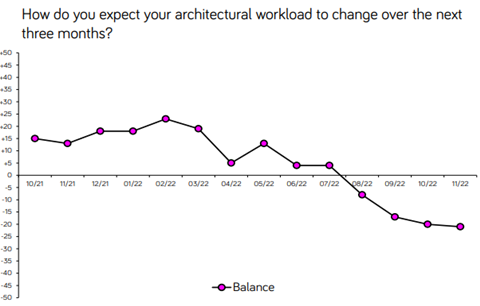RIBA’s latest Future Trends survey published as Bank of England raises interest rates by a further 0.5%
More than a third of architects now expect workloads to decrease in the coming months as worries in the sector about the impact of a recession continue to mount.

RIBA’s Future Trends survey for November found 34% of practices anticipate falling workloads over the next three months, with just 12% expecting them to increase.
Jitters about potential staff layoffs have also re-emerged following a slight recovery in hiring prospects in October.
The survey’s permanent staffing index for November returned to negative territory after posting a balance of zero for the preceding month, with 11% of practices anticipating redundancies. Any index figure below zero indicates negative expectations.

On balance, more practices now expect their headcount to fall over the next three months than those who expect it to rise, although 83% still expect staff numbers to stay the same.
All four work sectors covered in the survey have also stayed below zero, with private housing, which has been by far the most buoyant sector since the covid pandemic, falling by a further four index points to -21. Nearly a third, 32%, of practice expect workloads in this sector to decrease.
>> See also: Top 50 Architects 2022
The commercial and community sectors also slid by a further four points, posting -12 and -14 respectively. The public sector is the only sector to show some improvement, posting a figure –10, up by 2 points from October.
While the rate of deterioration has slowed, with the index for workloads dropping by just one point in November, the amount of work practices expect is down 8% year-on-year.
Yesterday the Bank of England hiked interest rates again by 0.5% to 3.5%, the highest for 14 years, in the latest effort to control inflation. Chancellor Jeremy Hunt said the measure was vital to avoid “permanently embedding high prices into our economy”.
RIBA head of economic research and analysis Adrian Malleson said architects are still grappling with rising inflation, material and construction price increases and a scarcity of tradespeople.
“Time and again, practices report that local planning delays are causing projects to slow, stall, or be abandoned altogether.
”There are reports too that the latest hike in interest rates has also caused planned funding for some projects to fall through.
“Small-scale domestic work has been hit particularly hard. With people having less disposable income, and mortgages now either unavailable or too expensive, architects are receiving fewer new enquiries, a reduced pipeline of work, and increased pressure on fees,” he said.
Confidence is still in negative territory across the country, although there are some signs of improvement. London, which has been the least pessimistic region in recent surveys, has recovered slightly from -32 to -26, while the Midlands and East Anglia has edged up two points to -21.
But all other regions have seen a loss of optimism, with the South of England at -35, Wales and the West at -26 and the North of England at -22.



























No comments yet